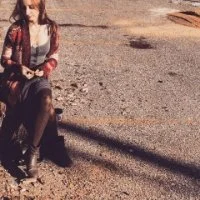Sitting on Palimpsests: An Interview with Alvin Pang
Singaporean poet Alvin Pang met several HFR editors at AWP in Minneapolis and, upon discovering that many of us would be in Singapore that summer on various fellowships, casually suggested meeting up. One May afternoon, he kindly crammed as many of as us as we could fit into his car and took us for a tour of Singapore. Between pointing out the most haunted building in Singapore, lunch at a hawker center, and wine at the Flower Dome, he sat down with us in the National Library for a conversation.
-Sue Hyon Bae
Read More
A Mini-Q&A with Muriel Nelson
DOCK Contributor Muriel Nelson shares the secret behind the delicious final stanza in her poem, "On Silent Haunches"
KJB: The line from Psalm 19:2 seems to be a perfect companion for the way in which you respond/pay homage to Sandburg’s, “Fog”. Did you find any of the rest of the Psalm informing the poem, or did the line just spring out to you organically?
Read More
WE ARE OPEN FOR SUBMISSIONS
Dear wonderful readers, past contributors, up-and-coming authors, and old souls,
We are officially open for submissions.
Love,
Hayden's Ferry Review
Read More
Ernesto L. Abeytia Reviews In Like Company: The Salt River Review & Porch Anthology
In Like Company: The Salt River Review & Porch Anthology, edited by James Cervantes, is equal parts reminiscent and refreshing measured over the course of thirty plus years of poetry and fiction.
For longtime readers of the former print journal Porch (1977-1981), and its later online counterpart the Salt River Review (1997-2010), this collection serves as a spring well of memories, eliciting fond recollections of such things as “The shared silence / in the land of ants. / The sleep of lizards / that never hear the bell. / Talk of fish / about things liquid. / Stories of the spider / at war with the mosquitoes” (9).
Read More
Kyle J. Bassett Reviews Ruth Baumann’s wildcold
Ruth Baumann’s chapbook, wildcold, opens with Rilke’s instruction, “Listen to the night as it makes itself hollow”. Here, I must admit my hesitance to dive into any work that prefaces itself with an oft-quoted (and often misquoted) poet. And here is where I am glad to say my literary-prejudice had its teeth kicked in.
Read More
....And You Should Also Be Reading: ELKE
ELKE “a little journal” was founded in 2015 and their first issue released in November of that year by former Hayden’s Ferry Review intern Elijah Tubbs and Kennedy Dawn Stearns. The magazine consists of poetry, fiction, nonfiction, interviews and an occasional art piece now and then. ELKE prints their magazine whenever they feel they have received a good amount of work they find worthy of putting on a physical page, but will try to keep to printing at least three times a year. The print copies of their magazine are small and cute, measuring up at six by four inches, just big enough to fit in a jacket pocket or comfortably in a bag. Along with the physical copies, ELKE runs a website where work is published often.
Read More
Rebecca Wood Interviews Dinika Amaral
RW: The story focuses on food and household items rather than people, is there a specific value you are trying to place on objects in household routines, maybe more so than the actual people?
DA: I was trying to prioritize objects over people, but couldn’t manage it. After the idea for SoBT was born I stuck with revising it for a couple years because I wanted to write a story without people that was still interesting for the reader.
Read More
Gary Joshua Garrison Reviews John Williams’s Stoner
John Williams’s Stoner — which this month is celebrating its 50th anniversary with a tastefully geometric hardback edition from New York Review Books — is a quiet novel; a portrait painted in sober tones of the life of a somber, unremarkable man, a story that unfolds softly and with grace. The book treads along with William Stoner, from his birth and childhood on a small family farm in rural Missouri, to university where he is awakened to his inner life, on through World War I and the Great Depression, his years as an instructor, his marriage, the birth of his family, the destruction of it, and finally, inevitably, his death. It’s the stuff of Russian literature, and a novel that has become more necessary today than ever before.
Read More







